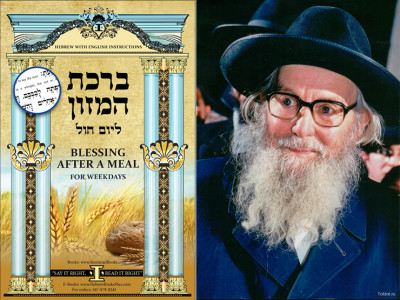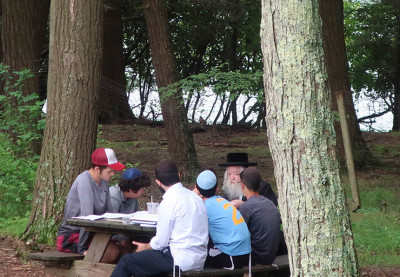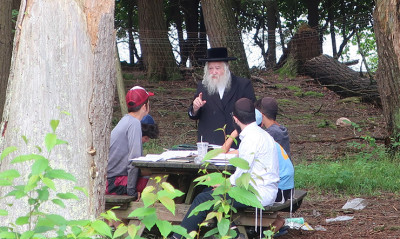


What will be the new life of the Jews on the land, into which the Almighty leads them?
We’ve already said in the preface that the book of Devarim not only reminds Jews of their experiences, but also explains how they should behave in their own country. Staying in Eretz Yisrael is a responsible business.
In Parashat Bechukotai in Vayikra, we talked about the special accounting the Almighty requires of us when we are in the Holy Land. Parshat Eikev (“For the fact that….”) warns the Jews that nowhere can they reach such closeness to God as in Eretz Yisrael, provided that they keep and fulfill His laws.
The parashah contains a description of the Land of Yisrael, in which many important things are said about it: “The Lord, your God, leads you to a good country, to the land of streams, springs and wellsprings that come out [to the surface] in the valley and on the mountain. To the land of wheat, and barley, and grapes, and figs, and pomegranates, olive and honey, to a country where… you will have no shortage of anything, to a country whose stones are iron and from whose mountains you will extract copper ”(Devarim 8: 7-9).
In the valley and on the mountain is said to indicate the advantages of Eretz Yisrael over Egypt, which was irrigated with water from irrigation ditches diverted off the Nile. There were no water sources on the heights.
The verse “To the land of wheat, and barley, and grapes, and figs, and pomegranates, olive and honey” lists seven types of fruits and grains for which Eretz Yisrael is famous. (The word “honey” means the juice of ripe dates.)
“Where… you will not have a lack of anything” refers to a land which has everything a person needs.
“…To a land whose stones are iron and from whose mountains you will extract copper”—we mentioned these words in Parashat Vayeira in the book Bereishit, citing Werner Keller’s arguments about the practical significance of the Tanach in our life.
Immediately after these we read:
“And you will eat, and you will be satisfied, and you will bless the Lord your G-d, for the good land that He gave you” (Devarim 8:10).
We say these words every day—as many times as we happen to eat a piece of bread of a certain size during the day. They are part of Birchat Hamazon—a special text containing blessings pronounced by Jews after a meal that contains bread.
You need to know that before and after meals, Jews read special texts in which they thank the Almighty for the benefits received. There are texts of blessings for different types of food (when eaten without bread): for the fruits of the earth (mainly vegetables); for the fruits of trees (mainly fruits); for non-vegetable products (meat, fish, eggs and so on), water, milk and all other drinks (except grape wine); and for dishes cooked and baked from grains (except for bread).
The seven types of fruits and grains listed in the verse we have just read are highlighted. After eating food made from those grains and/or fruits, a general blessing is pronounced that is different from all others. A special blessing is also pronounced over grape wine.
Jews take a meal with bread, and bread itself, very seriously; after such a meal, we recite, as mentioned above, the Birchat Hamazon—a text that contains four blessings.
When the Jews ate the Mon, they recited the first of them after eating, which Moshe established: “Blessed are You, G-d, our G-d, the King of the universe, feeding the whole world out of His kindness...”
The second blessing was added by Yehoshua bin Nun after the Jews conquered their country: “We thank You, Lord, our G-d, for giving our fathers a beautiful, kind and vast country as an inheritance. You brought us out of the land of Egypt... both for the union that You sealed on our body, and for Your Torah, which You taught us...”
When David made Jerusalem his capital, a third blessing was added—about Jerusalem. Today we read it in this form: “Have pity, O Lord, our G-d, over Israel, Your people, and over Jerusalem, Your city, and over Zion, where Your glory dwells, and over the kingdom of the house of David, You anointed, and over the great and holy Temple, called by Your Name… ”
The fourth blessing in Birchat Hamazon—“Kind and Doing Good…”—was introduced by the sages after the destruction of the Temple (more precisely, after the Romans allowed the bodies of the participants in the Bar-Kochba uprising who died in Beisar to be buried). The story of this blessing is told in the Talmud, in the tractate Berachos.
So, the prospects for the Jews are very bright: the land where G-d leads them is beautiful, and— as it was said at the beginning of the parashah— G-d will help the Jews expel other peoples from it and take possession of it. But, telling about all this, Moshe constantly warns the people: All this will come true if you begin to do what G-d brings you here for. It is easy for a prosperous person to forget to Whom he owes his well-being and go astray:
“Beware lest you forget the Lord your G-d, violating His commandments, and His laws, and His ordinances, which I command you now. And then, when you will eat and be satisfied, and build good houses and settle in them, and your large and small livestock will multiply, and silver and gold will multiply with you, and you will have a lot of everything, then your heart will become arrogant, and you will forget Of the Lord, thy G-d, who brought you out of the land of Egypt, from the house of slavery… Who fed you manna in the wilderness… And you will say in your heart: ‘My strength and the might of my hand have obtained all this wealth for me’… If you forget the Lord your G-d… I bear witness against you this day that you will surely perish, like the nations that the Lord is destroying before you…” (Devarim 8:11-20).
By Rabbi Yitzchok Zilber ztk"l
Founder, Toldot Yeshurun
Parshat Eikev
Typography
- Smaller Small Medium Big Bigger
- Default Helvetica Segoe Georgia Times
- Reading Mode




